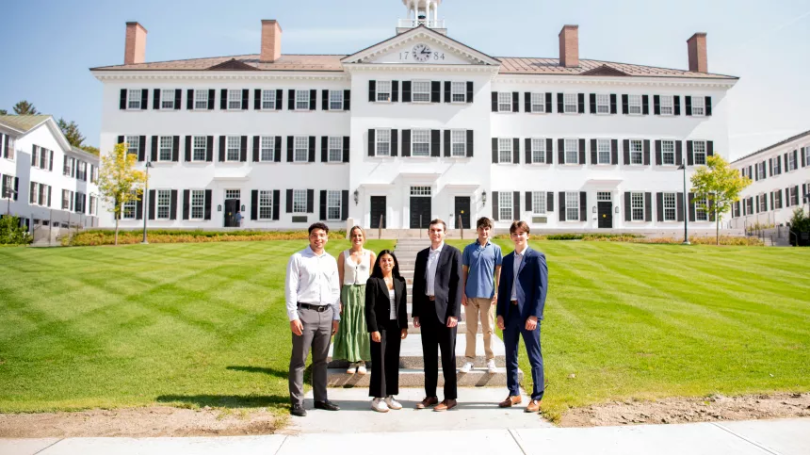
- About
- News & Events
- Programs
- Students
- Faculty
Back to Top Nav
Back to Top Nav
Back to Top Nav
Back to Top Nav
Below is an article, written by William Harris about the Dartmouth Political Union published online on the site Fire. The original story can be found here.
Today, 7 in 10 Americans believe the United States is headed in the wrong direction on freedom of expression, but Dartmouth College junior Mac Mahoney isn't one of them.
Mac is optimistic about his generation's ability to discuss controversial subjects.
He believes his fellow students can handle disagreement on contentious issues like sex work, gender, and gun control — and for good reason. As president of the Dartmouth Political Union since March, Mac and his team hosted successful events on these very issues last school year with speakers from across the political spectrum.
Every Wednesday, you'll find Mac and fellow students at DPU meetings, which are open to the whole campus and feature student debate. Some of Mac's favorite memories come from those meetings. He describes freshmen debating whether legacy status should be considered in admissions and said "both sides included really compelling arguments and were really friendly with each other."
Mac emphasizes that DPU students are open to hearing challenging ideas.
"A large meeting in the winter regarding climate change went similarly well," he recounts. "Someone who voiced really controversial opinions got positive feedback after the event ended from students who said they'd never been exposed to such viewpoints before."
Baker Memorial Library at Dartmouth College with green stripes in the background, indicating the school has received a "Green Light" speech code rating from FIRE.
But it's the DPU's keynote events and guest debates — with a star-studded roster of past visitors that includes former CIA Director John Deutch, scholar Noam Chomsky, and writer Frank Wilderson — that are often the biggest draw. When public figures come to campus, the DPU helps coordinate classroom visits, dinners, and small-scale meetings so students can engage with visitors in more intimate settings. Former president of the DPU, Jess Chiriboga, tells FIRE that when they do, "they should expect tough questions."
Jess credits the tight-knit faculty at Dartmouth with supporting the DPU's efforts to promote open discourse and critical thinking on campus. She says the aim is to hear from "the furthest left to the furthest right and everyone in between." The rest of the group's leadership agrees. At a time when scholar sanctions, deplatformings, and cancel campaigns undermine free speech on campuses across the country, Dartmouth administrators and faculty are supporting engagement between the student body and thinkers who pose difficult ideas.
Dartmouth, the only Ivy League school that earns FIRE's highest "green light" speech code rating, gives students like Mac good reason to be optimistic about free speech on campus.
Dartmouth first earned a green light rating in 2005, meaning it maintained no policies that seriously threatened student speech. But after the school set up a bias incident reporting protocol that did threaten student speech, FIRE was forced to downgrade the school to a "yellow light" rating in 2015. Earlier this month, FIRE announced that Dartmouth officially reclaimed its overall green light speech code rating after working with us to realign its written policies with First Amendment principles. Dartmouth, like the DPU, reflects the continual work that is necessary to uphold a culture of free expression.
Students William Reicher and Vlado Vojdanovski founded the DPU in 2018 in response to Dartmouth's ailing speech environment. After observing pervasive ad hominem attacks being voiced on campus in anticipation of a visit by conservative commentator David Horowitz, they aimed to create a nonpartisan student organization that fostered open discourse across the political spectrum. "Campus was very politically divided, particularly after the 2016 election," Jess told FIRE. "And there were political organizations on campus that could not talk to each other and they wanted to have a space on campus where students from a variety of different political affiliations could come together and have real respectful and substantive conversations about the pressing issues of our time."
"It's a great time to be a free speech person on Dartmouth's campus."
Mac says that progress at Dartmouth is "thanks to FIRE, because the work FIRE does is what allows students to do the work the DPU does." He says that "at Dartmouth in particular, there's been a lot of resources given to dialogue efforts." The DPU's no-holds-barred conversations, events, and debates, alongside Dartmouth's recent policy changes, demonstrate the scale of impact that free-speech-friendly initiatives can have on campus, which is nothing short of transformative.
Kavya Nivarthy, vice president of the DPU, says many students leave events with feedback like, "Wow, I had no idea that people on the other side thought this way and it really opened up my mind to this."
This fall, the DPU is launching a new initiative to promote discourse on some of the most contentious issues in politics, inviting experts on both sides of the issues to discuss abortion, DEI programming, media and the election, and democratic socialism versus capitalism.
As Kavya tells FIRE: "It's a great time to be a free speech person on Dartmouth's campus."